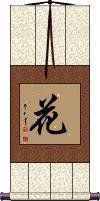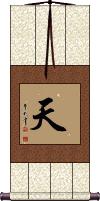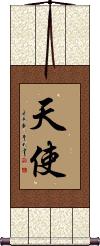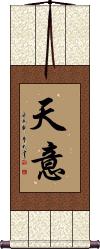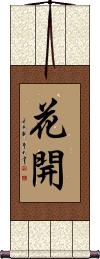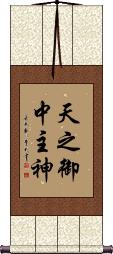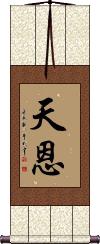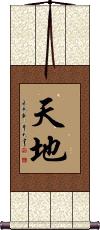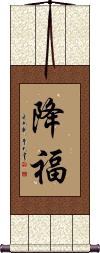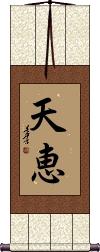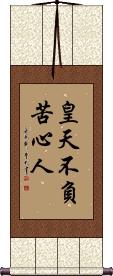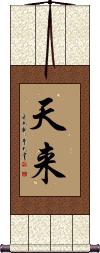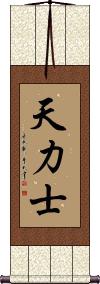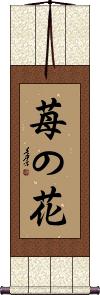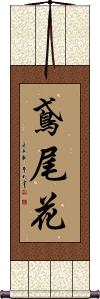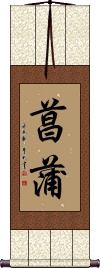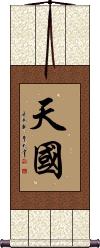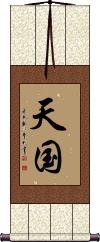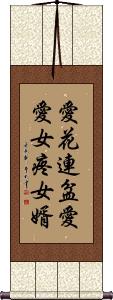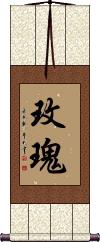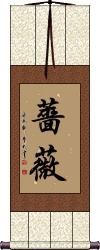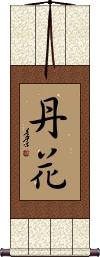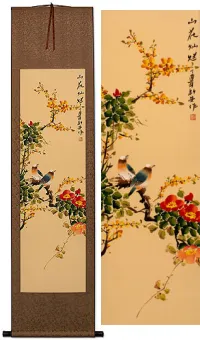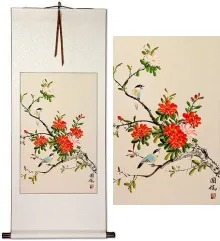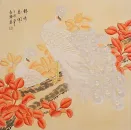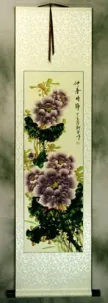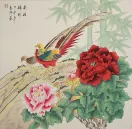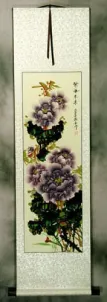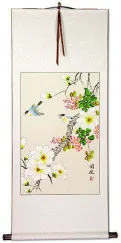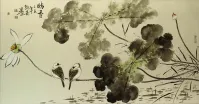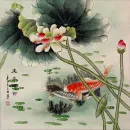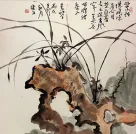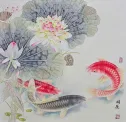Many custom options...
And formats...

Not what you want?
Try other similar-meaning words, fewer words, or just one word.
Heaven Flower in Chinese / Japanese...
Buy a Heaven Flower calligraphy wall scroll here!
Personalize your custom “Heaven Flower” project by clicking the button next to your favorite “Heaven Flower” title below...
Switched to secondary search mode due to lack of results using primary.
These secondary results may not be very accurate. Try a different but similar meaning word or phrase for better results. Or...
Look up Heaven Flower in my Japanese Kanji & Chinese Character Dictionary(My dictionary is a different system then the calligraphy search you just tried)
If you want a special phrase, word, title, name, or proverb, feel free to contact me, and I will translate your custom calligraphy idea for you.
1. Flower
2. Heaven
3. Angel / Messenger of Heaven
4. Destiny Determined by Heaven
5. Flower Open / Blooming Flower
6. Flower in the Mirror, Moon on Water
7. God in the Glorious Center of Heaven
8. Grace from Heaven / Grace from God
10. Heaven Blessing
12. Heaven Blesses the Diligent
14. Heaven Sent
16. Ichigo No Hana / Strawberry Flower
17. Iris Flower
18. Jasmine Flower
20. Love the Flower, Love the Pot also
21. Magnolia Flower
23. Oneness of Heaven and Humanity
24. Rose Flower
25. Red Flower
Flower
花 is the simple way to write “flower” in Chinese, Japanese, and old Korean.
It can also mean blossoms or can refer to a fancy or assorted pattern.
Note: In some contexts, it can mean “spend money.” However, as a single character, it will be read as a flower.
This has the meaning of Xochitl (flower) in Spanish, so if your name is Xochitl, I suggest this character to represent your name.
More random information about this character:
花 is the Korean surname spelled as “Hwa” before the Korean Romanization reformation of 2000-2001.
It's also a somewhat common given name in China (for females).
花 is a borrowed word from Chinese, so it sounds similar in Chinese and Korean.
Heaven
天 means “heaven” or “sky” in Chinese, Japanese Kanji, and old Korean Hanja.
The context determines if you are talking about heaven or the sky above (often they are the same concept).
When combined with other characters, words like “today” and “tomorrow” are created. While sometimes the character for “sun” is used to mean “day,” often “sky” represents “day” in Asian languages.
Example: 今天 (this sky) = “today,” 明天 (next sky) = “tomorrow” in modern Chinese and Japanese.
In Chinese culture, regardless of which religion, it's almost always assumed that God (and any other deities) live up above the sky. The concept of God living in the sky is likely the reason heaven is associated with this character.
The equation goes something like this: God's domain is the sky, thus, the sky is heaven.
Note: As a single character, this is a little ambiguous, so you might want to choose our Kingdom of Heaven selection instead.
Angel / Messenger of Heaven
天使 is the meaning of Angel in Chinese, Japanese Kanji, and old Korean Hanja.
The first character means heaven. The second means messenger. Together it makes sense that we are talking about angels as Heaven's Messengers.
If you are an “Angel Junkie,” this may be the wall scroll for you.
I also think it's a great choice if your name happens to be Angel.
See Also: Angel
Destiny Determined by Heaven
天意 is a way to express destiny in a slightly religious way.
天意 means “Heaven's Wish” or “Heaven's Desire,” with the idea of fate and destiny being derived as well. It suggests that your destiny comes from God / Heaven and that your path has already been chosen by a higher power.
My Japanese dictionary defines this word as “divine will” or “providence,” but it also holds the meaning of “the will of the emperor.” Therefore, I don't suggest this phrase if your audience is Japanese - it feels strange in Japanese anyway.
Flower Open / Blooming Flower
These two characters mean “flower open.”
花開 is also associated with Springtime, the beginning of something, or youth.
花開 is often followed by 花落 or “flower falls” (closes and loses its petals) which means “Things come and go” or “Youth comes and goes.”
If you like flowers and Springtime, this is a great selection for you. However, if you want the companion “flower falls” (flower withers), we offer that as a companion wall scroll or all together as a four-character phrase.
See Also: Flowers Fall
Flower in the Mirror, Moon on Water
鏡花水月 is an old Asian proverb that means “flowers in a mirror and the moon reflected in the lake” or “flowers reflected on a mirror and the moon reflected on the water's surface.”
Literally, 鏡花水月 reads “Mirror Flower, Water Moon.”
Figuratively this can be used to represent a lot of different ideas. It can be used to express an unrealistic rosy view or viewing things through rose-tinted spectacles. So you can use it to relay an idea about something that is visible but has no substance,
something that can be seen but not touched, or something beautiful but unattainable such as dreams or a mirage.
This expression is used to describe things like the subtle and profound beauty of poems that cannot be described in words.
鏡 = Mirror (or lens)
花 = Flower(s)
水 = Water
月 = Moon
Can also be written 水月鏡花 (just a slight change in word/character order).
God in the Glorious Center of Heaven
天之御中主神 is a phrase submitted by a customer.
I do not have information on the origin of this phrase.
Grace from Heaven / Grace from God
天恩 is the deepest way to say “Heaven's Grace” or “God's Grace” in Chinese.
The first character means Heaven or sky (referring, in this case, to the domain of God).
The second character means grace, blessings, benevolence, favor/favour, acts of kindness, merits, or beneficial influence.
This title can also be defined as:
Blessings of Heaven, Favor of the Emperor, Divination's luckiest day, or blessings of nature. Note: When you see “Emperor” above, remember that the Emperor, like the Pope, is theoretically chosen by God or seen as an emissary or conduit of God in ancient Asian culture. It would only be read that way in a certain context, such as “The Emperor, in his mercy, bestowed upon him Heaven's Grace, and the prisoner was set free.”
Note: Technically, this is a Japanese word too (pronounced "ten-on") but it’s rarely used in Japan anymore. Therefore, this title is best if your audience is Chinese.
Grace from Heaven / Grace from God
Heaven and Earth
天地 is “Heaven and Earth” in Chinese, Japanese Kanji, and old Korean Hanja.
This title is used in many different contexts. It can be a general term but is also used by Buddhists and in other religions.
This can also be used to refer to all of nature, the universe, the top and bottom, the realm of life, or the sphere of existence.
Heaven Blessing
Blessed by Heaven
天恵 means “Heaven's Blessing,” “Blessings from Heaven,” or “Blessed by Heaven” in Japanese Kanji.
Depending on the context in which this is used, it can also mean “gift of nature,” or even “natural resources” (as in Heaven or God bestowed things like oil, iron, gold, and other natural resources upon mankind).
Heaven Blesses the Diligent
天道酬勤 can be interpreted in a few different ways:
God blesses those who work hard.
It is the way of Heaven to smile on the diligent.
God will reward those that are worthy.
Heaven blesses those who are diligent.
Whichever translation you like, a scroll like this on your wall may serve as a reminder to work hard because your diligence will pay off both in this life and the next.
Note: This can be pronounced in Korean, but it's not a commonly used term.
Heaven Rewards Hard Work
Heaven Sent
Warrior of Heaven
天力士 means “Heavenly Warrior,” or “Hero of Heaven,” in Chinese, old Korean, and Japanese.
Often used in a Buddhist context.
Ichigo No Hana / Strawberry Flower
Iris Flower
鳶尾花 is the title for the iris flower in Chinese and Japanese.
If your name happens to be Iris, this is a beautiful way to express your name by meaning in both of these languages (it will mean your name but not sound like your name).
Can also mean wall iris, roof iris, or Iris tectorum.
Note: There are other titles for specific iris varieties - contact us if you need something special.
Iris Flower
菖蒲 is the title for the iris flower in Japanese.
If your name happens to be Iris, this is a nice way to express your name by meaning in Japanese (it will mean your name but not sound like your name).
Can also mean Siberian iris (Iris sanguinea) or sweet flag (Acorus calamus / Acorus gramineus) varieties.
Note: This will also be recognized in Chinese, though it is generally written with the addition of a character meaning "stone" in front of this title in Chinese.
Jasmine Flower
Kingdom of Heaven
天國 is the very Christian way to refer to the “Kingdom of Heaven” in Chinese, old Korean, and Japanese. 天國 is also the translation for “paradise.”
The first character means “Heaven.” The second character means “kingdom” but, in modern times, has been extended to mean “country” (but no one will translate this particular character combination as “Heaven Country”). 天國 is the ancient version of this word, as in modern times (after WWII), the second character was simplified in mainland China and Japan.
Kingdom of Heaven
天国 is the same meaning and pronunciation as our other entry for “Kingdom of Heaven,” but the second character was simplified in Japan and mainland China to this version.
Choose the appearance that you like best (they will be somewhat universally understood - as most people are aware of this simplification in places where they still use all traditional characters - such as Taiwan and Hong Kong). You can consider the other version to be the “ancient version.”
Love the Flower, Love the Pot also
Love Me, Love My Dog
This proverb, 爱花连盆爱爱女疼女婿, literally translates as “If one loves a flower, [one will] love its pot; [if one really] loves [one's] daughter, [one will also] love [one's] son-in-law.”
Figuratively, is similar to the English proverbs:
Love me, love my dog.
Love for a person extends even to the crows on his roof.
Magnolia Flower
One Family Under Heaven
天下一家 is a proverb that can also be translated as “The whole world is one family.”
It is used to mean that all humans are related by decree of Heaven.
The first two characters can be translated as “the world,” “the whole country,” “descended from heaven,” “earth under heaven,” “the public,” or “the ruling power.”
The second two characters can mean “one family,” “a household,” “one's folks,” “a house” or “a home.” Usually, this is read as “a family.”
Note: This proverb can be understood in Japanese, though not commonly used.
Oneness of Heaven and Humanity
天人合一 is a title that represents the oneness of heaven and humanity. It conveys the idea that man is an integral part of nature.
You can also read this as “heaven and man in unity,” or “nature and man in unity.” The “man” is really “people” or “humans” and is not gender-specific in Chinese.
Rose Flower
(The flower of love)
Rose Flower
(The flower of love)
薔薇 is the universal way to write rose (as in the flower) because it is understood in both Chinese and Japanese (same characters in either language). 薔薇 is also a common way to write about roses in Asian poetry. This can be translated as “wild rose” if you are looking for that title.
薔薇 is also how to write “rose” in old Korean Hanja (though they now use Hangul, and most Koreans of this generation will not be able to read this without a dictionary).
Red Flower
Voice of Heaven / Voices from Heaven
天堂之音 is a title that can be translated as either “voice of heaven” or “voices from heaven.”
The first two characters mean heaven.
The third character is a possessive article (kind of like making heaven into heaven's).
The last character means voice but can also mean sound.
Note: This can be pronounced in Korean, but it's not a commonly used term.
This in-stock artwork might be what you are looking for, and ships right away...
Gallery Price: $200.00
Your Price: $79.88
Gallery Price: $108.00
Your Price: $59.88
Chinese Golden Pheasant and Flower Painting
Discounted Blemished
Gallery Price: $63.00
Your Price: $35.00
Gallery Price: $322.00
Your Price: $178.88
Gallery Price: $60.00
Your Price: $36.88
Chinese Bird, Stone, and Orchid Flower Painting
Discounted Blemished
Gallery Price: $53.00
Your Price: $29.00
Gallery Price: $538.00
Your Price: $298.88
The following table may be helpful for those studying Chinese or Japanese...
| Title | Characters | Romaji (Romanized Japanese) | Various forms of Romanized Chinese | |
| Flower | 花 | hana | huā / hua1 / hua | |
| Heaven | 天 | ten | tiān / tian1 / tian | t`ien / tien |
| Angel Messenger of Heaven | 天使 | ten shi / tenshi | tiān shǐ / tian1 shi3 / tian shi / tianshi | t`ien shih / tienshih / tien shih |
| Destiny Determined by Heaven | 天意 | teni | tiān yì / tian1 yi4 / tian yi / tianyi | t`ien i / tieni / tien i |
| Flower Open Blooming Flower | 花開 花开 | huā kāi / hua1 kai1 / hua kai / huakai | hua k`ai / huakai / hua kai | |
| Flower in the Mirror, Moon on Water | 鏡花水月 镜花水月 | kyou ka sui getsu kyoukasuigetsu kyo ka sui getsu | jìng huā shuǐ yuè jing4 hua1 shui3 yue4 jing hua shui yue jinghuashuiyue | ching hua shui yüeh chinghuashuiyüeh |
| God in the Glorious Center of Heaven | 天之御中主神 | tiān zhī yù zhōng zhǔ shén tian1 zhi1 yu4 zhong1 zhu3 shen2 tian zhi yu zhong zhu shen tianzhiyuzhongzhushen | t`ien chih yü chung chu shen tienchihyüchungchushen tien chih yü chung chu shen |
|
| Grace from Heaven Grace from God | 天恩 | tiān ēn / tian1 en1 / tian en / tianen | t`ien en / tienen / tien en | |
| Grace from Heaven Grace from God | 神の恩恵 | kami no on kei kaminoonkei | ||
| Heaven and Earth | 天地 | tenchi | tiān dì / tian1 di4 / tian di / tiandi | t`ien ti / tienti / tien ti |
| Heaven Blessing | 降福 | jiàng fú / jiang4 fu2 / jiang fu / jiangfu | chiang fu / chiangfu | |
| Blessed by Heaven | 天恵 | ten kei / tenkei | ||
| Heaven Blesses the Diligent | 天道酬勤 | tiān dào chóu qín tian1 dao4 chou2 qin2 tian dao chou qin tiandaochouqin | t`ien tao ch`ou ch`in tientaochouchin tien tao chou chin |
|
| Heaven Rewards Hard Work | 皇天不負苦心人 皇天不负苦心人 | huáng tiān bù fù kǔ xīn rén huang2 tian1 bu4 fu4 ku3 xin1 ren2 huang tian bu fu ku xin ren huangtianbufukuxinren | huang t`ien pu fu k`u hsin jen huangtienpufukuhsinjen huang tien pu fu ku hsin jen |
|
| Heaven Sent | 天来 | tenrai / takara / sora | tiān lái / tian1 lai2 / tian lai / tianlai | t`ien lai / tienlai / tien lai |
| Warrior of Heaven | 天力士 | ten riki shi tenrikishi | tiān lì shì tian1 li4 shi4 tian li shi tianlishi | t`ien li shih tienlishih tien li shih |
| Ichigo No Hana Strawberry Flower | 苺の花 | ichigo no hana ichigonohana | ||
| Iris Flower | 鳶尾花 鸢尾花 | ichi hatsu hana ichihatsuhana | yuān wěi huā yuan1 wei3 hua1 yuan wei hua yuanweihua | yüan wei hua yüanweihua |
| Iris Flower | 菖蒲 | ayame / shoubu ayame / shobu | chāng pú / chang1 pu2 / chang pu / changpu | ch`ang p`u / changpu / chang pu |
| Jasmine Flower | 茉莉花 | ma ri ka / marika | mò lì huā mo4 li4 hua1 mo li hua molihua | |
| Kingdom of Heaven | 天國 天国 | tengoku | tiān guó / tian1 guo2 / tian guo / tianguo | t`ien kuo / tienkuo / tien kuo |
| Kingdom of Heaven | 天國 天国 | tengoku | tiān guó / tian1 guo2 / tian guo / tianguo | t`ien kuo / tienkuo / tien kuo |
| Love the Flower, Love the Pot also | 愛花連盆愛愛女疼女婿 爱花连盆爱爱女疼女婿 | ài huā lián pén ài ài nǚ téng nǚ xù ai4 hua1 lian2 pen2 ai4 ai4 nv3 teng2 nv3 xu4 ai hua lian pen ai ai nv teng nv xu | ai hua lien p`en ai ai nü t`eng nü hsü ai hua lien pen ai ai nü teng nü hsü |
|
| Magnolia Flower | 木蘭花 木兰花 | mù lán huā mu4 lan2 hua1 mu lan hua mulanhua | ||
| One Family Under Heaven | 天下一家 | tenka ikka / tenkaikka / tenka ika | tiān xià yī jiā tian1 xia4 yi1 jia1 tian xia yi jia tianxiayijia | t`ien hsia i chia tienhsiaichia tien hsia i chia |
| Oneness of Heaven and Humanity | 天人合一 | tiān rén hé yī tian1 ren2 he2 yi1 tian ren he yi tianrenheyi | t`ien jen ho i tienjenhoi tien jen ho i |
|
| Rose Flower | 玫瑰 | méi guì / mei2 gui4 / mei gui / meigui | mei kuei / meikuei | |
| Rose Flower | 薔薇 蔷薇 | bara / shoubi bara / shobi | qiáng wēi qiang2 wei1 qiang wei qiangwei | ch`iang wei chiangwei chiang wei |
| Red Flower | 丹花 | tan ga / tanga | ||
| Voice of Heaven Voices from Heaven | 天堂之音 | tiān táng zhī yīn tian1 tang2 zhi1 yin1 tian tang zhi yin tiantangzhiyin | t`ien t`ang chih yin tientangchihyin tien tang chih yin |
|
| In some entries above you will see that characters have different versions above and below a line. In these cases, the characters above the line are Traditional Chinese, while the ones below are Simplified Chinese. | ||||
Successful Chinese Character and Japanese Kanji calligraphy searches within the last few hours...
